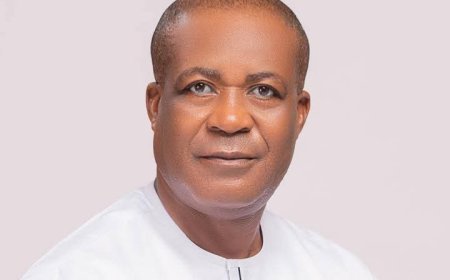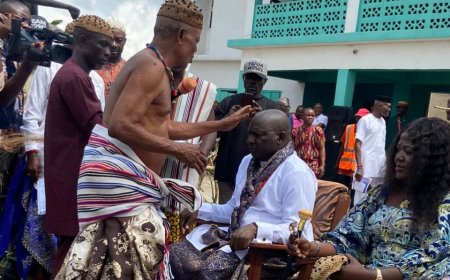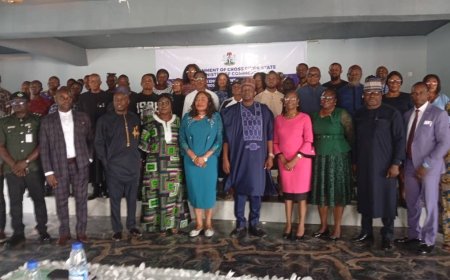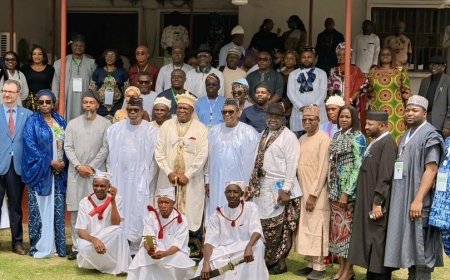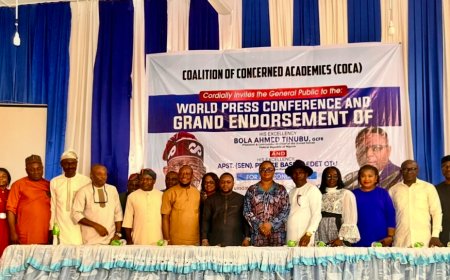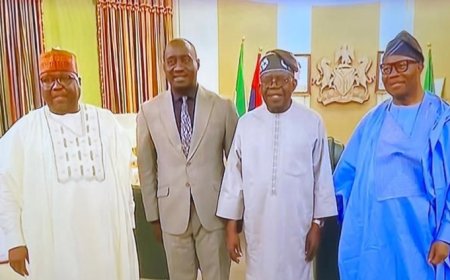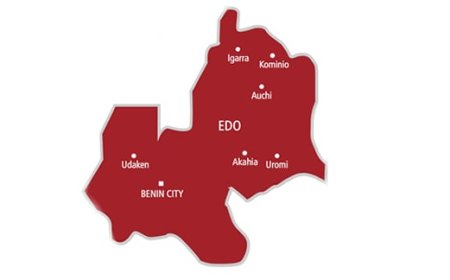OPINION: KEMI BADENOCH’S CLAIMS AND NIGERIAN CITIZENSHIP

By Prof. Joseph Ekpe Edet
Kemi Badenoch leader of the opposition in an interview with CNN’s Fareed Zakaria, asserted that she cannot pass on her Nigerian citizenship to her children because of her gender. She suggested that it is easier for Nigerians to acquire British citizenship than for foreigners to become Nigerians. According to her “It’s virtually impossible, for example, to get Nigerian citizenship. I have that citizenship through my parents. I can’t give it to my children because I’m a woman…Yet loads of Nigerians come to the UK and stay for a relatively free period, and acquire British citizenship. We need to stop being naive.
This article therefore looks at citizenship acquisition in Nigeria and elsewhere.
Citizenship is one of the most important political statuses, and a person may acquire it in any particular circumstance. Thus, whenever any individual claims any right or privilege which accrues from citizenship of a society, community or country, that individual has a burden of proving that he, indeed, is a citizen or national of that particular society, community or country. The term citizenship has various meanings and definitions. In one sense, citizenship may be used interchangeably with nationality to denote a state of being a full member of a society, community or country. In this sense, an individual is a citizen of a society, community or country if that individual is also a national of that society, community or country. The term citizenship may also be used to classify the wider term nationality. In this sense, nationality may be used broadly to include both citizens and non-citizen nationals who owe permanent allegiance to a country. A citizen is a native or naturalised individual who owes allegiance to a government (as of a state or nation) and is entitled to the enjoyment of governmental protection and the exercise of civil rights. In Herriot v City of Seattlecitizens are defined as members of a political community who in their associated capacity, have established or submitted themselves to the dominion of a government for the promotion of their general welfare and protection of their individual as well as collective rights. In one of his first acts as the 47th president of the United States, Donald Trump signed an executive order aimed at ending automatic citizenship in the United States of America. This is known as birthright citizenship. Trump's order seeks to deny citizenship to the children of people who are either in the US illegally or on temporary visas. This paper seeks to question the legality of Trump’s deprivation order vis-à-vis the provision of the 14th Amendment and scrutinises citizenship in Nigeria.
CITIZENSHIP IN BRITAIN
In 1948, Britain, for example, recognised three classes of its nationals:
(1) The citizens of the United Kingdom and Colonies: This was the old colonial status given to British Citizens during the period 1 January 1949 to 31 Dec 1982. Before 1949, British Citizens were called “British Subjects”, and in the modern day(after 1982) referred to as “British Citizens”.
(2) The Commonwealth citizens: A citizen or qualified national of a Commonwealth of Nations member state. The Commonwealth is an association of countries across the world historically connected to the British Empire. However, any country can apply to be a member of the Commonwealth, regardless of its intersection with Britain’s colonial past. There are presently 56 countries.
(3) The British protected persons. A member of a class of British nationality associated with former protectorates, protected states, and territorial mandates and trusts under British control.
CITIZENSHIP IN THE UNITED STATES OF AMERICA
PRESIDENT TRUMP AND BIRTHRIGHT CITIZENSHIP
The 14th Amendment to the US Constitution establishes the principle of birthright citizenship thus:
All persons born or naturalised in the United States, and subject to the jurisdiction thereof, are citizens of the United States and of the state wherein they reside. No state shall make or enforce any law which shall abridge the privileges or immunities of citizens of the United States; nor shall any State deprive any person of life, liberty, or property, without due process of law; nor deny to any person within its jurisdiction the equal protection of the laws”.
Consequently, a person born outside of the United States to parents who were born or naturalised in the U.S is a citizen of the United States of America. In the United States, birth within the United States is territorial. A child born in any of the States of the United States is automatically an American citizen, and, of course, a citizen of the individual state within which the child was born, whether or not the parents are legal or illegal aliens of the United States.
There are arguments against this policy framework which has been described as a "great magnet for illegal immigration". It is also said that it encourages pregnant women to cross the border to give birth and remain in the US. It has also been referred to as "birth tourism" or having an "anchor baby".However the protagonists of birthright citizenship point out that it has been the law of the land for well over a century and that eliminating it would create
Immigrants’ Rights Advocates Sue Trump Administration Over Birthright Ci...
New order puts newborns in harm’s way, is unconstitutional, and flouts fundamental American value.
a "permanent subclass of people born in the US who are denied full rights as Americans.
The concept of birthright citizenship, also known by the legal term "jus soli", is rooted in the English common law and was generally accepted to apply to white men throughout early American history. However, it did not become part of the Constitution until 1868, when the 14th Amendment was passed in the wake of the US Civil War to settle the question of the citizenship of freed, American-born former slaves. In Dred Scott v Sandford the US Supreme Court stated that enslaved people were not citizens of the United States of America and therefore could not expect any protection from the federal government or the courts. The case also determined that African Americans could never be US citizens. The opinion also stated that Congress had no authority to ban slavery from a Federal territory. This was before the 14th Amendment. In a dramatic move in 1898, the US Supreme Court ruled that birthright citizenship applies to the children of immigrants in the case of US v Wong Kim Ark. Wong was a 24-year-old child of legal Chinese immigrants who was born in the US, but denied re-entry when he returned from a visit to China. Wong successfully argued that because he was born in the US, his parents' immigration status did not affect the application of the 14th Amendment. The court ruled in Wong's favour and outlined a few limited exceptions to birthright citizenship, such as for children of diplomats. The "Wong Kim Ark” case affirmed that regardless of race or the immigration status of one's parents, all persons born in the United States were entitled to all of the rights that citizenship offered. This case has not been overruled by nor has the Supreme Court reversed itself.
The Trump administration's arguments rest on the clause in the 14th Amendment that reads "subject to the jurisdiction thereof". It argues that the language excludes children of non-citizens who are in the US unlawfully. Courts have generally disagreed with this position too. Thus in Plyler v Doe, a 1982 Supreme Court case involving a different part of the 14th Amendment, this argument has equally been rejected that undocumented immigrants were not "persons within its jurisdiction". The court ruled that migrants are both subject to US laws and granted the protections afforded by them. Conclusively, only a constitutional amendment could do away with birthright citizenship, but that would require a two-thirds vote in both the House of Representatives and the Senate and approval by three-quarters of the US states. This seems like a virtual impossibility on such a controversial proposal, given the current finely balanced divide in American politics.
How to Acquire a Nigerian Citizenship.
(i) Citizenship by Birth
Unlike the United States Citizenship which is territorial, Nigerian citizenship by birth is a combination of the customary international law principles of “jus soli” (citizenship by birth within a country) and “jus sanguinis” (citizenship by blood relation to the citizen’s parents).
S. 25(1)(a) of the 1999 Nigerian Constitution confers Nigerian citizenship by birth on any person born in Nigeria on or before 1st October, 1960, if any of his parents or grandparents born in Nigeria belongs or belonged to an ethnic Nigerian community. The locus classicus is the case of Shugaba Darman v Minister of Internal Affairs. The plaintiff applicant a member of the Great Nigerian Peoples Party (GNPP) and the Majority Leader in the Borno State House of Assembly was deported from Nigeria by the National Party of Nigeria-led Federal Government and its agents, the Nigerian Immigration Service. An application was filed on behalf of the plaintiff to enforce his fundamental rights where he successfully established that his father was a Chadian while his mother was a Nigerian and he sought a declaration to the effect that he is a Nigerian Citizen. It was held per, Adefila J. that the deportation was unconstitutional, null and void. The court held that once a person proves that either of his parent is a Nigerian Citizen, under the Constitution then he cannot be deported being a citizen.
S.25(1)(a) requires a person born on or before 1st October, 1960 to be born in Nigeria. Being born in Nigeria in a narrow sense may mean being born within any of the 36 states of Nigeria and/or the Federal Capital Territory of Abuja (F.C.T. in Abuja). This envisages territorial birth, like in the United States, and mere birth within any of the states or F.C.T of Abuja will automatically confer Nigerian citizenship by birth on the person, whether or not his parents or grandparents were citizens of Nigeria. Here, even a transient visitor to any of the 36 states or F.C.T. of Abuja, may be conferred with Nigerian citizenship. Mere birth within Nigeria is not enough to confer Nigerian citizenship by birth. Rather, S.25(1)(a) of the constitution requires any of the parents or grandparents to belong to or have belonged to an ethnic Nigerian community. The problem with the phrase “belongs or belonged to an ethnic Nigerian community” is that it is broad enough to make an African from any part of Africa with a similar community like that of Nigeria to claim belonging to or having belonged to an ethnic Nigerian community.
(ii) Citizenship by Registration S.26
S.26(1) of the 1999 Constitution as amended makes citizenship by registration the second method of acquiring Nigerian citizenship.
S.26(2)(a) of the Constitution gives a wife of a Nigerian citizen who is not herself a Nigerian citizen the concession to register as a Nigerian citizen. The problem with this provision is that it is wide enough to qualify not only a woman who is currently married to a Nigerian citizen, but also a divorcee of a Nigerian citizen who might or might not have remarried. Another problem here is that the concession for citizenship by registration is made only to the wife of a Nigerian citizen, but not to the husband of a Nigerian citizen. The foreign husband of a Nigerian citizen must, therefore, have to naturalise if he desires to be a Nigerian citizen. The justification of this may be based on the African customary law rule that marriage is patrilocal, not matrilocal. The Nigerian woman whose husband has been discriminated against may, of course, contest this discrimination in court.
S.26(2)(b) of the Constitution also gives the concession for the grandchild of a Nigerian citizen to register as a citizen. This concession is given to a grandchild born outside Nigeria. It therefore excludes any grandchild born in Nigeria. Second, it gives a concession to a grandchild who is of full age and capacity. The problem here is one of determining what constitutes full age and capacity. Although full age and capacity means that he must be 21 years of age, until the President exercises his authority of making regulation under S.32(2) of the Constitution as amended, the uncertainty under S.26(2)(b) may remain speculative, and, therefore, depends largely on the whims of him who is President. Of course, it means also that he must certainly be a person of sound mind and one capable of taking vital decisions independently, including that of registration.
To be qualified to register as a Nigerian citizen, the applicant must satisfy the President that he is a person of good character. One problem with this is that the President is the judge of what character is good or not good. Although it is not certain what constitutes good character, it seems that a character will qualify to be good if he falls outside what constitutes bad character sufficiently enough to deprive a person of acquiring citizenship under Section 26 of the Constitution. The applicant, therefore, must be free from having committed criminal offences, such as murder, rape, robbery and misappropriation of government funds.
Secondly, to register as a citizen, the applicant must exhibit a clear intention of their desire to be domiciled in Nigeria. What constitutes a clear intention of being domiciled in Nigeria is also not clear. But domicile qualification here seems to presuppose a consistent stay in Nigeria for several years. He must either have been resident in Nigeria for a continuous period of 15 years immediately before his application or in the alternative, he must have resided in Nigeria for one calendar year (12 months) immediately before his application in addition to his second alternative, he must be able to show that in the twenty (20) years before that one year, he has resided in Nigeria for a total minimum of fifteen (15) years. The second alternative, of course, takes care of people who may occasionally return to their home country once in a while on leave, holidays or other assignments for fairly long periods. In America, a five (5) year continuous residency is required for a person married to a non-U.S. citizen or resident while a three (3) year residency is required for a person married to a U.S. citizen or resident.
Thirdly, to register as a citizen, the applicant must be willing to swear to the Oath of Allegiance to Nigeria as provided in the sixth (6) schedule.
S.26(1)(c) of the Constitution does not say what swearing to the oath of allegiance to Nigeria amounts to. But S. 28(2) of the Constitution makes the grant of citizenship conditional upon an effective renunciation of any other citizenship held by the applicant within twelve (12) months from the date of such regis
(iii) Citizenship by Naturalisation S.27
S.27(1) of the 1999 Constitution as amended makes citizenship by naturalisation the third method of acquiring Nigerian citizenship. This provision allows a foreigner who cannot acquire Nigerian citizenship by birth or registration to do so by naturalisation, if he satisfies the President that he has sufficiently fulfilled all the conditions prescribed by the law. To be granted a certificate of naturalization, therefore, the applicant must show, (in much the same degree) one, that he is a person of full age and capacity; second that he is a person of good character; third, a clear intention of his desire to be domiciled in Nigeria; and, fourth, that he is willing to swear to the oath of allegiance to Nigeria as prescribed in the seventh (7th) schedule to the constitution as amended. Fifth, the applicant must satisfy the Governor of the State where he resides or proposes to reside that he is acceptable or capable of being acceptable by a Nigerian ethnic community in Nigeria, and, of course, has been assimilated into the way of life of that local community. The Governor, of course, must issue the certificate of the applicant’s suitability.
Sixth, the applicant must satisfy the President that he has made or is capable of making a useful contribution to the advancement, progress and well-being of Nigeria.
Furthermore, by Section 42(2) of the Constitution, no citizen shall be subjected to any disability or deprivation merely because of the circumstances of birth, gender, or class. Therefore, her two children are Nigerian citizens. The fact that she may not want them to claim it is irrelevant. For now, they are dual citizens of Britain and Nigeria.”
Equally, Nigerian citizenship is not impossible for foreigners to obtain, as Sections 26 and 27 of the Constitution clearly state that foreigners can acquire Nigerian citizenship through naturalisation or registration once they meet the legal conditions. Kemi Badenoch should therefore be properly informed.
Joe EDET is the Vice Chancellor @ Arthur Jarvis University, Cross River State






